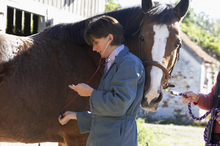Although fall weather has arrived in most areas, he Equine Disease Communication Center, which works to protect horses and the horse industry from the threat of infectious diseases in North America, continues to receive up-dates related to infectious diseases from many states.

Veterinarian checking horse for infectious disease symptoms
Although cooler fall weather has arrived in many areas, horses throughout the USA continue to be stricken with serious infectious diseases.
On October 11, 2017, the Oklahoma Department of Agriculture, Food and Forestry reported the third West Nile Virus positive horse for Oklahoma in 2017. The adult Quarter Horse mare located in Kay County was showing moderate neurologic signs. Vaccination history is unknown. A quarantine was not issued.
Also on October 11, the Michigan Department of Agriculture and Rural Development has received confirmation of two additional cases of Eastern Equine Encephalitis (EEE). Both of the horses were from Marquette County and were unvaccinated. The cases are as follows: a 25-year-old Quarter Horse gelding that developed a sudden onset of drooling, stumbling, blindness and seizures; and an 11-year-old Quarter Horse gelding from a different farm in Marquette County that was circling and stumbling. Both horses were euthanized. No quarantines were placed. These horses bring the total number of reported cases of EEE in Michigan for 2017 to six: two from Marquette County, two from Clare County, one from Roscommon County, and one from Wexford County.
On October 10, the Idaho Department of Agriculture confirmed West Nile Virus in a 1-year old female Quarter Horse with no history of vaccination. Initial signs on 9/16/17 included facial nerve deficit progressing to more severe neurological signs including ataxia in all 4 limbs. The horse's signs have been responsive to treatment. This is the 7th confirmed case of equine WNV in Idaho in 2017.
The New York State Department of Agriculture and Markets reported a confirmed case of Eastern Equine Encephalitis in Oswego County on October 10. The horse was euthanized.
The New York State Department of Agriculture and Markets also reported four confirmed cases of equine West Nile virus. One horse from St. Lawrence County is still alive but was not vaccinated for the disease. Three more horses from Cayuga County, Erie County, and St Lawrence County were euthanized. Two of the three were not vaccinated; one had been vaccinated but not enough time had elapsed for the vaccination to be protective.
On October 9, the Kentucky Department of Agriculture reported a confirmed case of equine West Nile virus. An adult Tennessee Walking Horse cross with no WNV vaccination history in Garrod County showed an onset of clinical signs on September 30th. The horse went down with proprioceptive deficits and was euthanized. This is the 14th confirmed case of equine WNV reported in KY in 2017.
On October 7, the Tennessee Department of Agricultures confirmed one horse with Equine Infectious Anemia in Bedford County, and also confirmed two cases of West Nile Virus, one in Davidson County and one in Knox County.
On October 6, the South Carolina State Veterinarian’s office has received laboratory confirmation for West Nile Virus (WNV) in a horse in Cherokee County. The 17 year old unvaccinated mare is alive but progressively deteriorating. This is the 4th case of WNV for South Carolina in 2017.
On October 4, the Wisconsin Department of Agriculture, Trade and Consumer Protection has confirmed equine case #21 of Eastern Equine Encephalitis for 2017.An 11-year-old unvaccinated QH mare from Shawano County was stumbling and generally ataxic on 10/2. The veterinarian sampled and treated the mare that day. The mare went down on 10/3 and was euthanized later that day. No quarantine was issued.
Wisconsin Department of Agriculture also confirmed Eastern Equine Encephalitis in a vaccinated 7-year old Quarter Horse mare in Price county. The mare was vaccinated in March 2017, and on 9/6/2017 was found down. The mare was treated on 9/6/17 and got up on 9/17/17. The mare is still neurologic (hypermetric and hyperesthetic) and because the mare is pregnant she is being treated in hopes of having a normal foal. Conformation of EEE was from NVSL.
In addition, the Wisconsin Department of Agriculture, Trade and Consumer Protection has confirmed West Nile Virus in two horses. The first is an 11-year old Tennessee Walking Horse gelding with signs of incoordination, hyperesthesia and being very subdued on 9/23/17 in Jefferson County. The horse was treated and is recovering. The second horse is an unvaccinated Standardbred stallion in Clark County found down and unable to rise on 9/1/17. The horse was being treated and was continuing to eat and drink but unable to rise a week later with current outcome unknown. Confirmation of WNV in both cases was from NVSL.
As most horse owners are well aware, infectious diseases can strike horses anytime, making an effective vaccination protocol important year round. In addition, many cases of infectious diseases are not reported, so horse owners should realize that many more cases of health-threatening diseases occur in all areas.
